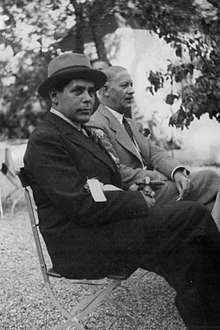Hans Frölicher
Dr. Hans Frölicher[nb 1] (1887 - 1961)[3] was the Swiss ambassador to Germany during World War II. He remains controversial in Switzerland due to his sympathies for the Third Reich while Ambassador in Berlin.[1][4]

Ambassador to Germany
Frölicher replaced Paul Dinichert, who had served as Ambassador to Germany between 1932 and 1938.[5] Frölicher was received by Adolf Hitler as Ambassador to Germany at a ceremony on June 9, 1938.[6] Early in his tenure, Frölicher was able to delay relocating the Swiss Embassy, which had been required to fulfill Albert Speer's vision of Germania.[7] Beginning in 1938, Frölicher was involved in negotiations between the governments of Germany and Switzerland aimed at reducing the number of Jews seeking refuge in Switzerland.[8]
In 1939, a Swiss theology student named Maurice Bavaud attempted to assassinate Adolf Hitler. Although Bavaud was facing execution, Fröhlicher refused to intervene, going so far as to decline an offer to exchange Bavaud for captured Gestapo spies imprisoned in Switzerland.[9][10]
Frölicher remained the Swiss Ambassador to Germany until 1945.[11]
Post-ambassadorship
A memoir of his was privately published in 1962, entitled Meine Aufgabe in Berlin (My Task in Berlin).[12]
Notes
References
- Capper, Scott (May 11, 2001). "Controversial new Swiss embassy opens in Berlin". Swissinfo.
- Reinhard R. Doerries (23 November 2004). Hitler's Last Chief of Foreign Intelligence: Allied Interrogations of Walter Schellenberg. Routledge. p. 126. ISBN 978-1-135-77289-5.
- Laurie R. Cohen (2013). Smolensk Under the Nazis: Everyday Life in Occupied Russia. Boydell & Brewer. p. 108. ISBN 978-1-58046-469-7.
- Peter Fritzsche (25 October 2016). An Iron Wind: Europe Under Hitler. Basic Books. pp. 137–138. ISBN 978-0-465-09655-8.
- Frank Bajohr; Christoph Strupp (2011). Fremde Blicke auf das "Dritte Reich": Berichte ausländischer Diplomaten über Herrschaft und Gesellschaft in Deutschland, 1933-1945. Wallstein Verlag GmbH. p. 187. ISBN 978-3-8353-0870-1.
- Paul Bruppacher (22 May 2013). Adolf Hitler und die Geschichte der NSDAP Teil 2: 1938 bis 1945 (in German). BoD – Books on Demand. p. 44. ISBN 978-3-8423-8627-3.
- "A German history lesson in one Swiss building". The Economist. July 11, 2013. Archived from the original on May 16, 2018. Retrieved May 16, 2018.
Hitler duly explained to the resident foreign missions that they had to move, and all except one did. The Swiss, however, were at this time represented by one Hans Frölicher, who sympathised with, and was close to, the Nazis. Mr Frölicher was able to slow down the negotiations and to secure a good new location for the Swiss.
- New, Mitya (15 August 1997). Switzerland Unwrapped: Exposing the Myths. I.B.Tauris. p. 18. ISBN 978-1-86064-300-2.
- Stephens, Thomas (November 7, 2008). "Switzerland "failed" would-be Hitler assassin". Swissinfo.
During Bavaud's imprisonment, the Swiss ambassador to Germany, Hans Fröhlicher, described the assassination attempt as a "despicable act" and never visited him. In 1940 the Swiss government was offered the chance to exchange Bavaud for a German hostage held in Switzerland – but they rejected the offer.
- Hellmut G. Haasis (2013). Bombing Hitler: The Story of the Man who Almost Assassinated the Fuhrer. Skyhorse Publishing Inc. p. 19. ISBN 978-1-61608-741-8.
- Colloquium helveticum. P. Lang. 2006. p. 172.
- Pierre Th. Braunschweig (19 September 2004). Secret Channel to Berlin: The Masson-Schellenberg Connection and Swiss Intelligence in World War II. Translated by Vonlanthen, Karl. Casemate. p. 405. ISBN 978-1-61200-022-0.